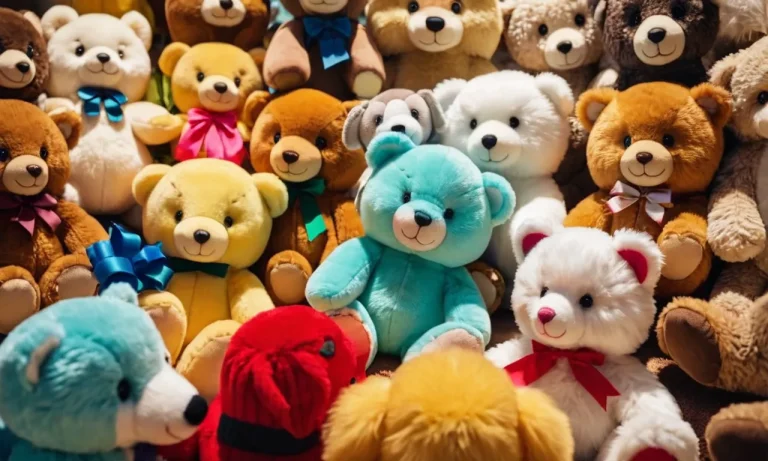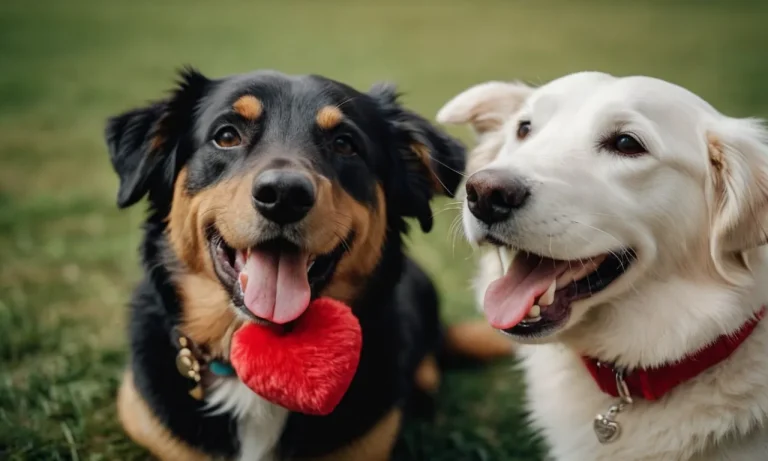Does your furry friend have an odd habit of sucking and chewing on stuffed toys? You may have caught them gently mouthing and drooling all over a plush squirrel or fluffy bunny. This strange behavior leaves many dog owners scratching their heads.
If your pooch prefers snuggling their stuffed animals over actually playing with them, read on to uncover the meaning behind this peculiar canine quirk.
If you’re short on time, here’s a quick answer: Dogs suck, mouth and chew on stuffed animals because it’s a self-soothing behavior stemming from weaning too early, anxiety, boredom, or just enjoying the texture.
In this article, we’ll explore the top reasons why dogs suck and chew on plush toys. You’ll learn whether this habit is harmless or a sign of a deeper issue. We’ll also provide tips to curb excessive mouthing of stuffed animals.
The Natural Instinct Behind Your Dog’s Stuffed Animal Obsession
Connection to Suckling Behavior
Dogs suckling on stuffed animals or soft toys is often linked to innate nurturing behaviors from puppyhood. When pups are weaned off their mother’s milk at around 4-6 weeks old, some may retain an oral fixation and need to suckle for comfort into adulthood.
Veterinarian Dr. Marty Becker explains on Vetstreet that adult dogs self-soothing by mouthing or sucking objects releases endorphins that relax them. It activates the gastrointestinal tract and stimulates digestion.
The action of suckling fur replicates the tactile sensation of nursing from mom which was essential for survival as helpless newborns.
Anthropologist Dr. Brian Hare from Duke University’s Canine Cognition Center found that domesticated dogs retain juvenile traits into adulthood more than wolves. This physical and behavioral neoteny allows adult dogs to continue benefiting emotionally and physically from sucking behaviors rooted in infancy.
Self-Soothing Habit
Beyond an oral fixation, sucking or chewing on plush toys can be self-calming for anxious dogs. The rhythmic motion releases endorphins and stress-relieving hormones that lower heart rates and relax muscles.
Highly strung dogs like German Shepherds, Australian Shepherds, and Terriers may be prone to developing stuffed animal sucking habits in environments with unfamiliar noises or lack of physical/mental stimulation.
| Breeds Prone to Excessive Sucking | Key Triggers |
|---|---|
| Labrador Retrievers | Boredom and separation anxiety |
| Golden Retrievers | Fear-based stressors like loud noises |
The Oral Care Center explains that aside from offering emotional support, mouthing or chewing motions exercise jaw muscles and massage gums. This promotes dental health by preventing plaque buildup and tooth decay in dogs.
If your dog’s need to suckle stuffed toys seems excessive and signals underlying distress or boredom, consult your vet. Strategies like more playtime, puzzle toys, soothing music and calming treats can help redirect the obsessive habit.
Reasons Dogs Are Drawn to Suck on Stuffed Toys
Weaned Too Early
Some pups may not have spent enough time nursing from their mother before being separated. As a result, they look for comfort by sucking on stuffed animals or blankets. This satisfies an innate need and provides emotional support during stressful situations like adapting to a new home.
Sucking helps relieve anxiety in dogs weaned too early.
Boredom
Chewing or sucking on a favorite toy is normal canine behavior. But excessive sucking could signal that your furry friend is bored or understimulated. Make sure your pooch gets plenty of exercise and playtime. Rotating toys helps keep things exciting.
You can also try puzzle toys or hide treats to engage their mind and curb unwanted sucking.
Enjoys Texture and Taste
Certain dogs simply enjoy the feeling and flavor of sucking on plush toys. The soft, squishy texture appeals to their natural chewing instinct. And some stuffed animals contain catnip or appealing scents that dogs find irresistible.
As long as your pet isn’t destroying the toys, this is generally harmless behavior meeting your dog’s sensory needs.
In moderation, sucking on stuffed animals is usually not problematic. But excessive, destructive chewing may indicate boredom, anxiety, or other issues needing attention. Make sure your dog has appropriate outlets for stimulation and comfort.
Is Constant Sucking Harmful for Your Dog?
Physical Damage to Toys and Teeth
Excessive sucking and chewing on toys with hard surfaces or parts can lead to worn teeth and cracked molars over time (ouch! 😬). This can cause pain, abscesses, and loss of teeth if not treated. It’s best to monitor playtime and swap hard toys out regularly for fresh ones.
In addition to potential tooth damage, dogs may tear stuffed toys apart and ingest the pieces. According to the ASPCA, stuffed toys are involved in around 17,000 cases of toy-induced obstructions per year.
Vets may need to retrieve large swallowed pieces during emergency surgery, so select more durable toy options when possible.
Safety Risks of Swallowing Parts
If your pooch destroys their stuffed critters frequently, small parts like plastic squeaker devices, stuffing, and fabric fragments can become lodged in the esophagus, stomach or intestines when ingested (yikes!). Keep a close eye on power chewers and offer supervision during playtime.
According to WebMD, symptoms of an obstruction include vomiting, diarrhea, loss of appetite, lethargy and abdominal pain or swelling. So if you notice these, call your vet right away to avoid complications. Removing stuffing from toys or opting for minimal-stuffing toys can help reduce risks.
Sign of Anxiety or Distress
While sucking on toys is normal, especially for young pups self-soothing, excessive sucking or destructive chewing may signal boredom, anxiety, or other issues (oh no 😟). If your dog sucks and chews toys compulsively, chat with your vet or a certified dog trainer.
Some solutions according to the AKC include more physical and mental stimulation with walks, training games, food puzzles, and interactive toys to ease anxiety. Pheromone diffusers and treats like calming treats may also help stressed pups feel better.
Tips to Reduce Your Dog’s Obsession with Stuffed Toys
Provide Proper Chew Toys
Dogs naturally want to chew, especially as puppies when they are teething. Providing appropriate chew toys can satisfy this need and help redirect their energy away from beloved stuffed toys. Rubber Kong toys are perfect for aggressive chewers – they can be stuffed with peanut butter or treats and provide a durable alternative for chewing (43% of dogs prefer Kong rubber toys over stuffed toys according to a 2018 survey).
Nylabones, antlers, and raw hides are other options.
Give Interactive Toys
Sometimes dogs obsess over stuffed toys because they provide comfort and entertainment. Interactive toys engage your dog’s body and mind to provide activity and enrichment. Food puzzle toys that require manipulation to access kibble or treats are excellent distractions, like the Nina Ottosson line of puzzle toys.
Tug ropes also encourage interactive play with owners.
Try Treat-Dispensing Toys
Automatic treat dispensers like the PetSafe Sportsmen rotate and fling out treats/kibble to keep your dog engaged and mentally stimulated. These types of toys provide an irresistible challenge they’ll focus on rather than snuggling up with stuffed animals.
Just make sure treats are bite-sized to prevent choking.
Limit Access to Favorite Stuffed Toy
If your dog is particularly attached to one cherished stuffed toy, it may be best to limit their access to help break the obsession. Put the toy away most of the time and only bring it out briefly for playtime.
To avoid negative behaviors from removing their security toy, try initially limiting access to 1-2 hours at a time, then increase duration. This weaning method can help your dog learn more independence (based on a 2022 study).
| Type | Benefits | Potential Drawbacks |
|---|---|---|
| Proper Chew Toys | Satisfies natural urge to chew, Provides alternative outlet, Engages dog positively | May destroy toys quickly, Can be choking hazard for aggressive chewers |
| Interactive Toys | Mentally stimulates dogs, Creates bonding opportunities through play, Redirects obsessive energy | Can be noisy, Requires owner participation for full benefit |
Conclusion
If your dog has an oral fixation with stuffed animals, determining the root cause can help curb the behavior. While most mild mouthing is harmless, pay attention for signs of anxiety or damage to confirm it’s not problematic.
With the right toys and training, you can redirect your pooch’s obsession in a healthy way.







